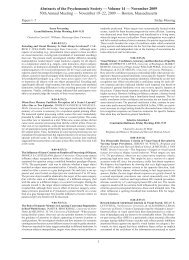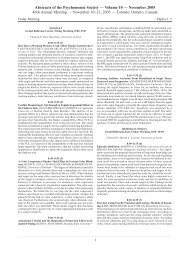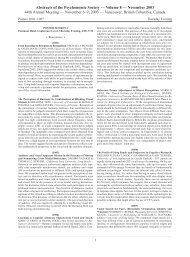S1 (FriAM 1-65) - The Psychonomic Society
S1 (FriAM 1-65) - The Psychonomic Society
S1 (FriAM 1-65) - The Psychonomic Society
You also want an ePaper? Increase the reach of your titles
YUMPU automatically turns print PDFs into web optimized ePapers that Google loves.
Friday Morning Papers 62–<strong>65</strong><br />
logical congruency effect in object, but not in color naming. Differences<br />
in the typical order of object nouns and color adjectives in<br />
French and English provide a plausible account for the cross-linguistic<br />
contrast in phonological activation.<br />
10:40–10:55 (62)<br />
Word Preparation Addresses Syllables but Not Segments in Mandarin<br />
Chinese. JENN-YEU CHEN, National Cheng Kung University,<br />
PADRAIG G. O’SEAGHDHA, Lehigh University, & KUAN-HUNG<br />
LIU, National Cheng Kung University (read by Padraig G.<br />
O’Seaghdha)—In Mandarin, speakers benefit from foreknowledge of<br />
what the first syllable of a disyllable will be, but not what the onset<br />
is (Chen, Chen, & Dell, 2002). We replicated the absence of an onset<br />
preparation benefit for disyllables (Experiment 1). <strong>The</strong>n we provided<br />
stricter tests using monosyllables. We found no preparation effect<br />
whether targets were cued by other monosyllables that could form a<br />
compound (Experiment 2) or that could not (Experiment 3), or by a<br />
nonlexical symbol (Experiment 4). <strong>The</strong>se results are in marked contrast<br />
to implicit priming results with European languages. We outline<br />
a theory in which advance planning addresses the primary level of<br />
phonological encoding below the word—syllables in Mandarin, segments<br />
in English and other Indo-European languages. In Mandarin,<br />
segments may be activated but are not prepared until after syllable<br />
production begins. Thus, the control structure for word encoding is<br />
fundamentally different in these languages.<br />
11:00–11:15 (63)<br />
Interactive Effects in Speech Production: Feedback or Perceptual<br />
Monitoring? MELISSA M. BAESE & MATTHEW A. GOLDRICK,<br />
Northwestern University (read by Matthew A. Goldrick)—Interactive<br />
effects are well documented at lexical and phonological levels of the<br />
production system (e.g., the mixed error effect; Dell, 1986). Acoustic<br />
analysis reveals such effects extend to postphonological processes:<br />
Lexical properties of words modulate their phonetic properties.<br />
Specifically, voice onset time (VOT) varies according to lexical<br />
neighborhood structure. For example, the /k/ in “cod” has a longer<br />
VOT than the /k/ in “cop.” This reflects contrasting neighborhood<br />
structure: “cod” has a highly similar neighbor “god,” whereas “cop”<br />
does not (“gop” is not an English word). We then examine the source<br />
of this interactive effect. It could reflect enhancement of articulation<br />
to help perception (listener modeling) or feedback-driven enhancement<br />
of lexical and phonological representations. To contrast these accounts,<br />
participants produced words in an interactive task where phonetic<br />
enhancement was unnecessary for successful communication.<br />
10<br />
Consistent with a production-internal feedback mechanism, phonetic<br />
enhancement was still present in speakers’ productions.<br />
11:20–11:35 (64)<br />
Amnesic H.M.’s Sentence Production: Parallel Deficits in Memory<br />
and Language. DON G. MACKAY & CHRISTOPHER B. HADLEY,<br />
UCLA, & LORI E. JAMES, University of Colorado, Colorado Springs—<br />
To test conflicting hypotheses regarding amnesic H.M.’s language abilities,<br />
this study examined H.M.’s sentence production on the Language<br />
Competence Test. <strong>The</strong> task for H.M. and 8 education-, age-, and IQmatched<br />
controls was to describe pictures using a single grammatical<br />
sentence containing 2 or 3 prespecified target words. <strong>The</strong> results indicated<br />
selective deficits in H.M.’s picture descriptions: H.M. produced<br />
fewer single grammatical sentences, included fewer target words, and<br />
described the pictures less completely and accurately than did the controls.<br />
However, H.M.’s deficits diminished with repeated processing of<br />
unfamiliar stimuli, and virtually disappeared for familiar stimuli, selective<br />
effects that help explain why some researchers claim that H.M.’s<br />
language production is intact. Besides resolving the conflicting hypotheses,<br />
this study demonstrates parallel deficits and sparing in H.M.’s<br />
language and memory, and replicates other well-controlled sentence<br />
production results. Present results comport in detail with binding theory<br />
but pose problems for system theory accounts of H.M.’s condition.<br />
11:40–11:55 (<strong>65</strong>)<br />
Not Saying What’s on Your Mind: How Speakers Avoid Grounding<br />
References in Privileged Information. LIANE WARDLOW LANE &<br />
VICTOR S. FERREIRA, University of California, San Diego (read by<br />
Victor S. Ferreira)—Speakers’ descriptions of shared objects sometimes<br />
implicitly refer to private information (i.e., privileged objects). In<br />
Experiment 1, speakers coped with a cognitive pressure to attend to<br />
privileged objects and a communicative pressure to avoid referring to<br />
privileged objects. <strong>The</strong> results show that when cognitive and communicative<br />
pressures compete, cognitive pressures win: Speakers implicitly<br />
referred to privileged objects more, even at the expense of communicative<br />
success. Experiment 2 showed that this was not due to task<br />
confusion. Experiment 3 directly tested whether increased attention<br />
causes increased references to privileged objects. <strong>The</strong> results showed<br />
more references to privileged information when privileged objects were<br />
made relatively more salient. Experiment 4 combined the attention manipulations<br />
of Experiments 1 and 3, revealing that they were not independent,<br />
suggesting that the separate effects were caused by similar or<br />
related mechanisms. Overall, speakers are compelled to cope with cognitive<br />
pressures, even at the expense of communicative efficacy.





